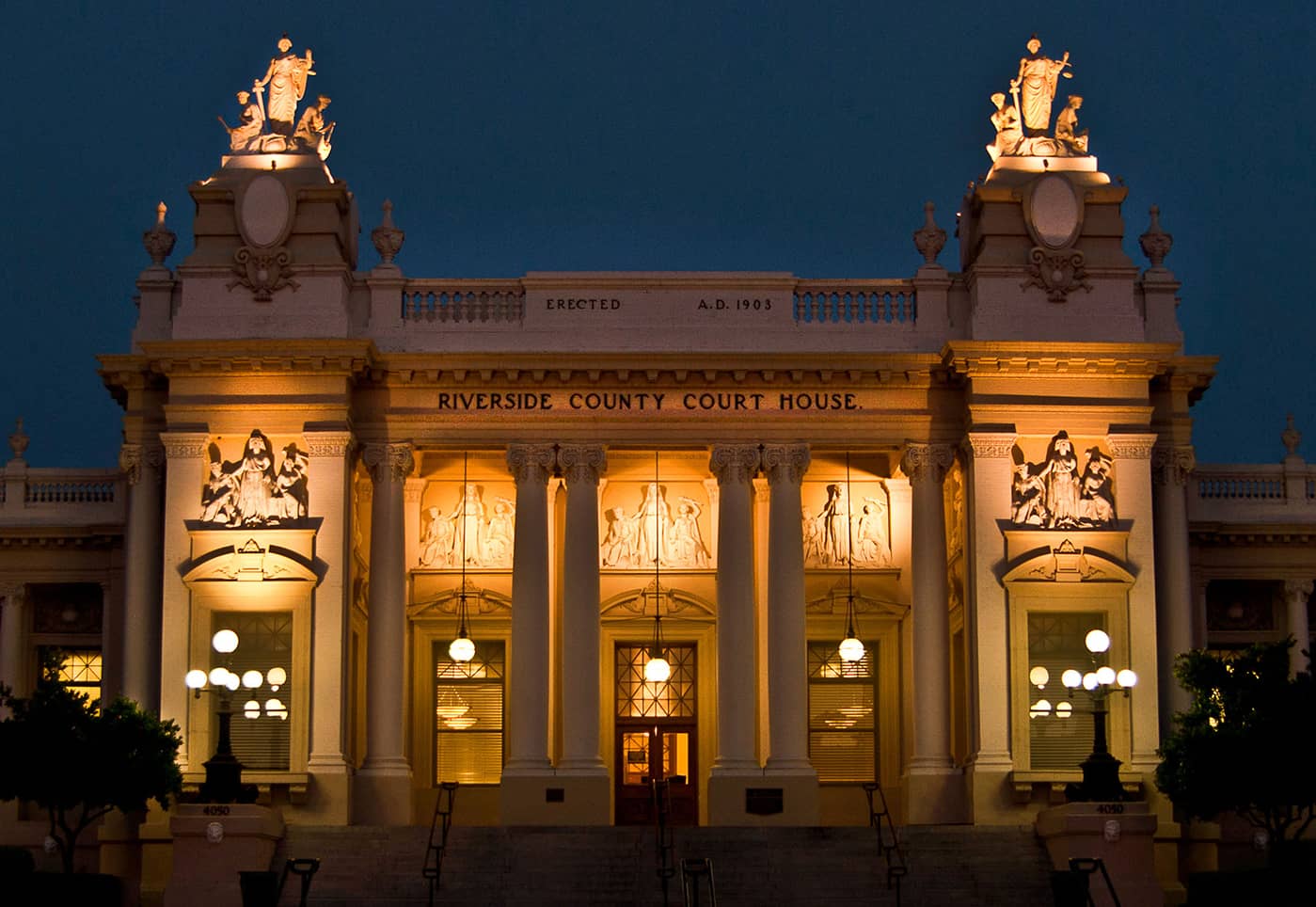The California Legislature Must Protect the Public by Allowing Background Checks for Employers, Nonprofits, and Landlords

On May 26, 2021, the California Court of Appeals, 4th A.D. (Riverside County), issued a ruling in the case of All of Us or None of Us v. Hamrick that removes significant identifiers, including date of birth and driver’s license number, from criminal records. This ruling creates significant barriers to the criminal background check process, making it difficult – if not impossible – for employers and housing providers to protect the public by conducting criminal background checks.
Following the decision out of Riverside County, superior courts in 11 counties in California, representing more than 21 million Californians (over half the state’s population), have removed date of birth search fields from their websites and/or public access terminals, even in places where background checks are required by law.
Why it Matters
Removing these significant identifiers from search databases leaves employers and housing providers unable to accurately confirm the identity of prospective employees or residents. This means that they can’t take basic steps to ensure the safety of our workplaces, neighborhoods and communities. Accurate background checks are essential to making sure someone with a history of child abuse isn’t working at a day care center, or an individual with a criminal driving record isn’t driving students on a school bus, or an arsonist isn’t living next door to you in your apartment building.
Importantly, employers, volunteer organizations, and nonprofits are having a difficult time hiring people quickly or placing volunteers in positions to help people in need. This is not the result anyone wants for those looking to hire workers or those in need of work.
What’s Next
Sen. Steven Bradford (D-Inglewood) has introduced S.B. 1262. This bill does not create new law, but returns court record searches to the status quo, before the Hamrick decision. In April, the bill passed the Senate Public Safety Committee on a 5-0 vote. Sen. Bradford chairs the committee.
The committee has four other members, Sen. Rosilicie Ochoa Bogh (D-Redlands), the vice-chair; Sen. Sydney Kamlager (D-Los Angeles); Sen. Nancy Skinner (D-Oakland); and Sen. Scott D. Wiener (D-San Francisco).
The bill’s introduction in January 2022, follows the 2021 denial of CDIA and PBSA’s motion to the California State Supreme Court to hear our case and grant our request for relief. Since neither CDIA nor PBSA was a party to the litigation, and since neither party appealed, we knew the chances that the Court would take the case would be very low.
A bill is clearly needed because of the late-2021 denial by the California Judicial Council of PBSA’s request to update Rule 2.507, This request included a subsection affirming that the rule does not require clerks to change their longstanding practices, and providing clarity on the ability to conduct background searches in the state of California.
Timeline
- May 26, 2021: All of Us or None of Us v. Hamrick was decided by the California Court of Appeals, 4th A.D. (Riverside County). The court called for the removal of significant identifiers (date of birth and/or driver’s license number) from criminal records based on an interpretation of California Rules of Court, Rule 2.507 [(Electronic access to court calendars, indexes, and registers of actions)]. The Court wrote that:
After considering the text, history, and purpose of Rule 2.507 [(Electronic access to court calendars, indexes, and registers of actions)], we agree that the rule prohibits the Riverside Superior Court from allowing searches of its electronic criminal index by use of an individual’s date of birth or driver’s license number. We further conclude that the trial court erred in sustaining defendants’ demurrer to this cause of action.
Rule 2.507 first became effective in 2002 when it was numbered Rule of Court 2077. In 2003, it was renumbered 2.507. The Hamrick opinion is a new interpretation of that nearly-20-year-old rule.
- July 7, 2021: PBSA sent a letter to California Chief Justice Tani Cantil Sakauye, who is also the Chair of the Judicial Council of California, requesting a change to Rule 2.507 by adding a new subsection to affirm that the rule does not require clerks to change their longstanding practices, and provide clarity on the ability to conduct background searches in the state of California. Unfortunately, that request was denied in December 2021.
- July 15, 2021: A diverse group of trade associations and businesses, all with a keen interest in protecting the public, signed on to an amicus letter to the California Supreme Court urging the Court to take up All of Us or None of Us vs. Hamrick.
- July 22, 2021: A second diverse group of trade associations and businesses, all with a keen interest in protecting the public, signed on to a supplemental amicus letter, again urging the California Supreme Court to take up All of Us or None of Us vs. Hamrick.
- July 15 and 22, 2021: The organizations signing on to both amici briefs were Apartment Association of Orange County, California Alarm Association, California Association of Boutique & Breakfast Inns, California Bankers Association, California Chamber of Commerce, California Credit Union League, California Hospital Association, California Hotel & Lodging Association, California Rental Housing Association, California Financial Services Association, California State Council of the Society for Human Resources Management, Checkr, Inc., Coalition for Sensible Public Records Access, Electronic Security Association, Hospitality Santa Barbara, Hotel Association of Los Angeles, Long Beach Hospitality Alliance, Lyft, Inc., Monitoring Association (The), Moco Incorporated, National Consumer Reporting Association, National Public Records Research Association, Public Records Retrieval Network
- July 22, 2021: The Plaintiff-Appellants filed an application to the California Supreme Court asking for leave to respond to the CDIA/PBSA coordinated joint amicus.
- August 13, 2021: CDIA and PBSA filed another letter with the California Supreme Court urging, again, the Court to take All of Us or None of Us by highlighting the practical, real-world implications of the Court of Appeal’s mistaken holding. CDIA and PBSA noted that appellate court’s decision is already having disastrous consequences—namely, the collapse of meaningful criminal background screenings in California and enormous obstacles in getting people into jobs in virtually every sector of the economy. CDIA and PBSA provided the Court with a list of the California superior courts that have removed date-of-birth search fields from their websites and/or public access terminals in the wake of the Court of Appeal’s decision in Hamrick. The data indicate that: (1) More than half the state’s population—22.3 million Californians—currently live in a county whose superior court has removed the date-of-birth filter from its online search engine, thus severely restricting the availability of meaningful criminal background checks in that county; and (2) More than 43% of Californians currently live in a county that has eliminated the date-of-birth filter entirely—not only online, but even at the public access terminals at the courthouse.
- August 18, 2021: The California Supreme Court granted itself an extra 30 days to consider the CDIA/PBSA petition, moving the deadline to Sept. 30.
- September 1, 2021: The California Supreme Court denied the CDIA/PBSA petition.
- November 4, 2021: The Consumer Financial Protection Bureau (CFPB) issued an advisory opinion noting that “name-only matching procedures [for background checks] without…other personally identifying information such as address [or] date of birth…does not assure maximum possible accuracy [as required by federal law].”
- December 2021: Cases were filed in several new courts asking those courts to shut down electronic access to identifiers in that county, as was done in Riverside County. New cases were filed in December 2021 by Fineman Poliner of Anaheim Hills: In Sonoma County Superior Court the case is Doe v. Junior (Arlene Junior is the executive officer of the Sonoma County Superior Court). In Merced County Superior Court the case is Doe v. Toste (Amanda Toste is the executive officer of the Merced County Superior Court).
- December 15, 2021: The Judicial Council of California issued a denial of the July 2021 request from PBSA, requesting a change to Rule 2.507.
- January 18, 2022: CDIA filed a public records request with the Judicial Council seeking materials that may have gone into its rulemaking decisions.
- February 11, 2022: CDIA filed a request to the Judicial Council of California seeking a change to Rule 2.507 to provide clarity on the ability to conduct background searches in the state of California. This request was rejected on March 29, 2022.
- February 17, 2022: A bill to allow background checks to proceed, and to get people to work more quickly, S.B. 1262, was introduced by Sen. Steven Bradford (D-Inglewood). Sen. Bradford chairs the Senate Public Safety Committee.
- March – April 2022: Over 40 national and California organizations sent a letter to Sen. Bradford supporting the passage of S.B. 1262. That letter was followed by a letter of five additional signatories. A letter of support was also filed by the Nonprofits Insurance Alliance. A letter of support was also filed by Checkr.
- March 29, 2022: CDIA’s February request to the Judicial Council of California seeking a change to Rule 2.507 was rejected by the committee of referral, the Criminal Law Advisory Committee (CLAC). “The committee carefully considered the proposal and determined that it may be beyond the scope of the council’s general charge to improve the quality and administration of justice. The committee concluded that the Legislature is a more appropriate forum for addressing the public policy issues raised therein.”
- April 25, 2022: The Senate Public Safety Committee released its analysis of S.B. 1262.
- April 26, 2022: The Senate Public Safety Committee heard (video, starts at 7:21:01) (unofficial transcript) and passed S.B. 1262 on a 5-0 vote.
- May 3, 2022: When it seemed like the bill would be referred to the Senate Appropriations Committee, CDIA sent a letter in support of S.B. 1262 to that committee. The bill wound up bypassing Appropriations and going right to the floor.
- May 10, 2022: Nearly 50 national and California organizations signed a memo to the California Senate urging passage of S.B. 1262.
- May 10, 2022: The Senate Rules Committee issued a floor analysis of S.B. 1262.
- May 24, 2022: The Senate passed the bill 37-0-3, with three members (Archuleta, Caballero, Hertzberg) not voting.
- June 2, 2022: The bill was referred to Assembly Public Safety. The committee is chaired by Reginald Byron Jones-Sawyer, Sr. (D-Los Angeles). Also on the committee are Assembly Members Tom Lackey (R-Palmdale), the vice-chair; Mia Bonta (D-Oakland); Isaac G. Bryan (D-Culver City); Bill Quirk (D-Hayward); Miguel Santiago (D-Los Angeles); and Kelly Seyarto (R-Murrieta).
- June 13, 2022: Nearly 50 national and California organizations signed a letter to the Assembly Public Safety Committee urging the passage of S.B. 1262. A letter of support was also filed by the Nonprofits Insurance Alliance. A letter of support was filed by the Morongo Gaming Agency, the agency that oversees gaming for the Morongo Band of Mission Indians in Riverside County, California. A letter of support was also filed by Checkr.
- June 28, 2022: S.B. 1262 was heard in Assembly Public Safety. Following the hearing, the bill passed 5-0-2 with two members not voting, the chair, Reginald Byron Jones-Sawyer, Sr. (D-Los Angeles), and Bill Quirk (D-Hayward). In advance of the hearing, the committee staff published the committee analysis. CDIA produced a rebuttal to this committee analysis.
- August 3, 2022: S.B. 1262 was heard in Assembly Appropriations. The hearing for S.B. 1262 is available from 1:27:48 to 1:41:41 (unofficial transcript). In advance of this hearing, CDIA sent a letter to the committee noting, among other things, how the bill is revenue positive. Also, nearly 50 national and California organizations signed a letter to the Appropriations Committee in support of the bill. Also in advance of the hearing, the committee staff released its staff analysis.
- August 5, 2022: S.B. 1262 was ordered to third reading in the assembly. Nearly 50 national and California organizations signed a statement of support for the bill on the assembly floor. In advance of the floor vote, staff produced an assembly floor analysis.
- August 31, 2022: S.B. 1262 passed the assembly 53-9, with 18 members not voting. The bill was referred to Gov. Gavin Newsom.
- September 7, 2022: Over 50 national and California organizations signed a letter to Gov. Gavin Newsom in support of S.B. 1262. Several other organizations asked the governor to sign the bill, including the Nonprofits Insurance Alliance of California (NIAC), and the California Retailers Association.
- September 29, 2022: Gov. Newsom vetoed S.B. 1262. In his veto message, he wrote that the “bill would override a 2021 appellate court decision and current court rules that strike a fair balance between public access to court records, public safety, and an individual’s constitutional right to privacy. While this bill may provide for a more convenient process for companies conducting commercial background checks, it would also allow any member of the public to easily access individuals ‘ sensitive personal information online.” While the comment about the fair balance between public access to court records is arguable at best, the comment that any member of the public to easily access individuals ‘ sensitive personal information online is not true.
- October 5, 2022: The governor’s veto message was sent to the senate and it was incorporated into a senate floor staff analysis.
- his veto message,
- his veto message,
Legislative Process

What is the Judicial Council?
The Judicial Council is the policymaking body of the California courts, the largest court system in the nation. Under the leadership of the Chief Justice (Hon. Tani G. Cantil-Sakauye) and in accordance with the California Constitution, the council is responsible for ensuring the consistent, independent, impartial, and accessible administration of justice. Judicial Council staff help implement the council’s policies.
The list of Judicial Council members is available online.
The Judicial Council has many internal and advisory committees. The rule request change has been referred to the Criminal Law Advisory Committee (CLAC).
Additional Resources
- A Long List of Supporters Seek Cal. Supreme Court Intervention on Harsh Background Check Decision (CDIA)
- FAQs on S.B. 1262
- California DOB Redaction Information (PBSA)
- California Court of Appeal Ruling Could Severely Restrict Employment Background Checks (JacksonLewis)
- Another Privacy Headache for California: Court of Appeal Ruling Will Slow Down Criminal Background Checks Throughout California (Littler Blog)
- Another Privacy Headache for California: Criminal Background Check Delays Throughout California (Littler webinar)
- Redaction of Identifiers by the Courts in Michigan and California Pose Challenges for Background Checks (Arnall Golden Gregory podcast)
- The CDIA Background Screening Information Center (BaSIC™) blog
Media

- Troubled California background check system is delaying hiring for elder care (KTLA, Channel 5)
- Riverside County courts make it harder for people to see justice at work: Editorial (Desert Sun, July 18, 2021)
Contact
For more information about this effort or other public record access issues, please contact:
CDIA
Eric J. Ellman, Senior Vice President for Public Policy and Legal Affairs, eellman@cdiaonline.org
Sarah Ohs, Director of Government Relations, sohs@cdiaonline.org
Mike Carone, Manager of Government Relations, mcarone@cdiaonline.org
PBSA
Melissa Sorenson, Executive Director, melissa.sorenson@thepbsa.org
Brent Smoyer, JD, State Government Relations & Grassroots Director, brent.smoyer@thepbsa.org
Jose Dimas, Government Relations Director of Public Records Access, jose.dimas@thepbsa.org